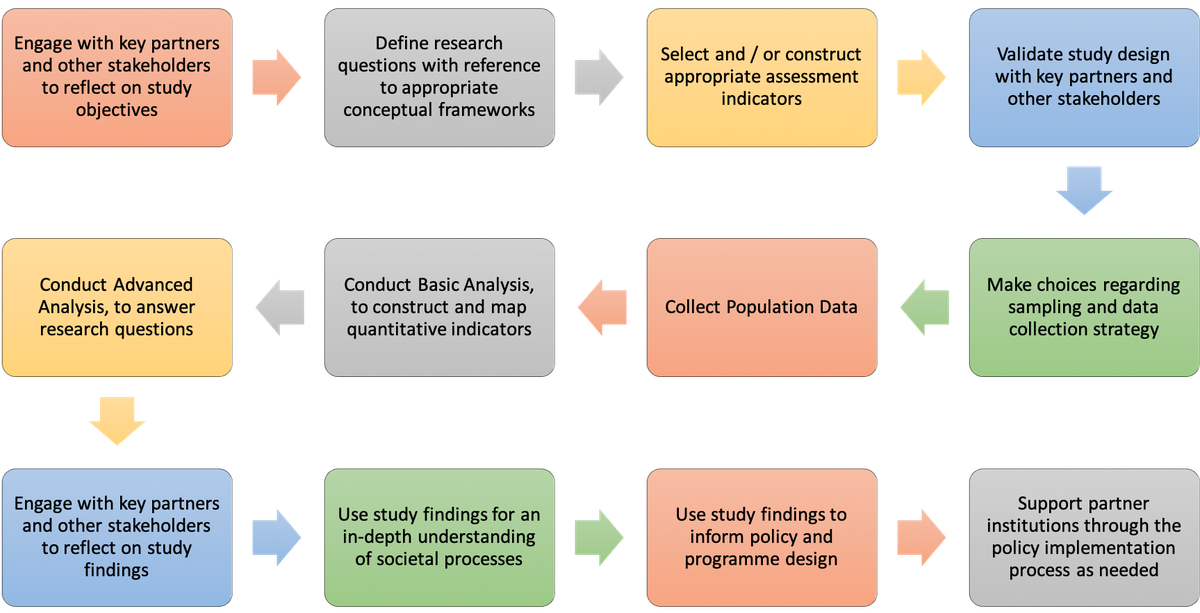SeeD's methodology (i.e. SCORE) for evidence-based policy and programme design for peacebuilding and social cohesion is a complex and versatile. Its versatility comes from its participatory research principles, contextual sensitivity and advanced analysis toolkit. It is designed to ensure national and international peace and development architects become the principal end users of research findings and policy recommendations to improve the effectiveness and impact of their efforts. Our methodology and analytical outputs serve as an adaptive management tool which embed evidence-based sustaining peace indicators into organisations’ monitoring and evaluation frameworks, and impact assessments.

Calibration
We work closely with national partners and stakeholders in each country to customize our methodology so that results meet the needs of the specific country context. This involves extensive desk research, inclusive consultations with representatives from government, civil society, academia, business, international organisations and local communities. We also reach out to remote communities outside of the capital to ensure that their opinions and experiences can be represented. In most projects, we establish an informal research advisory committee which serves as the Core Reflection Group and has the role of providing substantive advice and guidance throughout the design, implementation and interpretation of the research. Based on this calibration phase, we produce conceptual models, which incorporate different perspectives and stakeholder hypotheses similar to detailed theories of change, for different outcomes of interest (e.g. intergroup harmony, constructive citizenship, non-violence). These conceptual models, based on the qualitative research conducted during the calibration phase, then guide the selection and design of assessment instruments,, indicators and eventually the SCORE questionnaire (quantitative survey).
Data collection
The quantitative survey serves as the principal data collection tool for SeeD's SCORE Index. Depending on the needs of the partners and the context, we design the representative and granular sample frames to ensure that different regions (e.g. rural communities, urban centres, administrative regions), and different socio-demographic groups (e.g. ethnic groups, linguistic or experiential such as combatants) are represented. Data collection is conducted in collaboration with established national researchers or research agencies, who must display cultural awareness and sensitivity to ensure a reliable data collection process. For example, SeeD takes an active role in enumerator selection and training, and ensures that enumerators understand the sensitivities and particularities of the areas they are assigned to. The main survey is usually face-to-face interview based on stratified random sampling, however depending on the contextual needs, other data collection techniques may be used. For example, SeeD has also conducted numerous school-based youth surveys, expert scoring surveys and governance assessment surveys with civil servants.
Data analysis
Once the fieldwork is completed, results are processed using advanced data analysis techniques, to capture the quality of citizen-state relations, intergroup dynamics, psychosocial assets and civic attitudes. We use factor analysis and reliability tests to scale different questionnaire items into indicators. Our indicators are then visualised in the form of heatmaps to explore geographical patterns, and disaggregated by relevant characteristics to investigate specific target groups (e.g. age, gender, income level and ethnic/linguistic/religious affiliation). We also use cluster analysis (a.k.a population segmentation) and ANOVA/MANOVA to better understand non-demographic groups such as those who are exposed to a particular adversity or share a particular civic attitude. We also use predictive modelling techniques, including hierarchical linear regression and structural equation modelling to understand how social change might happen if particular policies were introduced. These predictive analyses provide the evidence to prioritise among competing policy options, enabling the cost-effective design of projects and programmes which are most likely to have a positive impact on peacebuilding and development outcomes.
Participatory dialogue for policy recommendations
Data analysis results are visualised and presented to policy makers and key stakeholders from the government, the international community and civil society to generate participatory dialogue. We interpret the results and implications through these reflection sessions and workshops. Our aim is to understand the contextual, historical and human stories and implications behind the data, identify further analysis and evidence needs and develop inclusive and constructive dialogue to ensure that research findings are translated into concrete policy and programmatic responses. Fostering local ownership of results is essential for generating evidence-based decision making and policy recommendations. To this end, our participatory process continuously solicits feedback from our partners. Depending on the context and partners' needs, collaborative interpretation of the evidence culminates into analytical products ranging from policy briefs to infographics, short videos to progress tracking posters.
Know-how and capacity development
Through all stages of our engagement with national partners we identify opportunities to train local researchers and practitioners on using evidence-based peacebuilding research methodologies. Our goal is to share and transfer knowledge, ensuring national experts can make use of evidence-based strategies to design community level peacebuilding, conflict prevention and development projects and approaches. The establishment of national reflection groups and the transfer of knowledge to national partners is an intrinsic part of our co-creation philosophy, which is designed to enhance the effectiveness and impact of peace agendas. In this way we accompany national partners from different parts of government and the wider society on the journey to produce results which support positive social change outcomes.